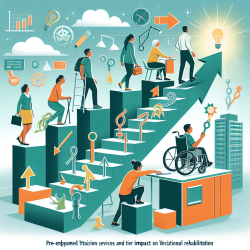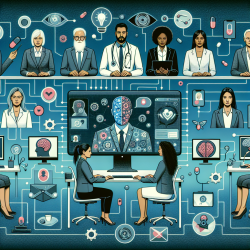Introduction
Students with disabilities face numerous challenges in securing employment, often due to a lack of effective transition services. A recent scoping review by Frentzel et al. (2021) has highlighted research-based interventions that can significantly improve employment outcomes for these students. By focusing on data-driven strategies, vocational rehabilitation (VR) counselors can better support students in their transition from school to the workforce.
Key Interventions and Strategies
1. Job Exploration Counseling
Job exploration counseling involves activities that help students understand their vocational interests and potential career paths. The review identifies several strategies:
- Career Goal Development: Setting clear, measurable career goals can significantly enhance employment outcomes.
- Family Outreach: Engaging families in the career exploration process provides valuable insights and support.
- Cultural Competence: Understanding the cultural context of students can guide more effective career exploration.
- Interagency Collaboration: Collaborating with schools and other stakeholders can enhance career exploration activities.
2. Work-Based Learning
Work-based learning experiences are crucial for preparing students for employment. Effective strategies include:
- Early Work Experience: Facilitating internships and volunteer opportunities can improve future employment prospects.
- Addressing SSI Barriers: Understanding the impact of Supplemental Security Income on employment can help navigate related challenges.
- Mentoring and Social Supports: Providing mentors and role models can enhance students' workplace skills and confidence.
3. Workplace Readiness Training
Developing social skills and independent living abilities are essential for workplace success. Key strategies include:
- Communication Exercises: Mock interviews and communication exercises can prepare students for real-world interactions.
- Social Skills Development: Identifying and improving necessary social skills can enhance workplace interactions.
- Transportation Training: Familiarizing students with transportation options can remove barriers to employment.
4. Instruction in Self-Advocacy
Empowering students to advocate for themselves is critical. Effective strategies include:
- Self-Determination Activities: Encouraging activities that foster self-determination can improve employment outcomes.
- Transition Planning: Ensuring students have a comprehensive transition plan in place is essential.
- Awareness of Accommodations: Educating students about available workplace accommodations can empower them to seek necessary support.
Conclusion
Implementing these research-based interventions can significantly enhance the effectiveness of pre-employment transition services for students with disabilities. By adopting these strategies, VR counselors can play a pivotal role in improving employment outcomes and empowering students to achieve their career goals.
To read the original research paper, please follow this link: Pre-employment transition services for students with disabilities: A scoping review.










